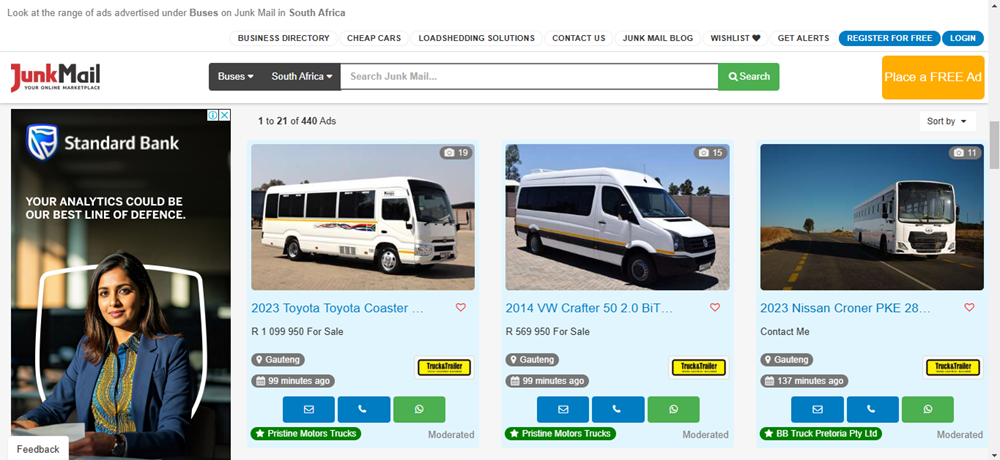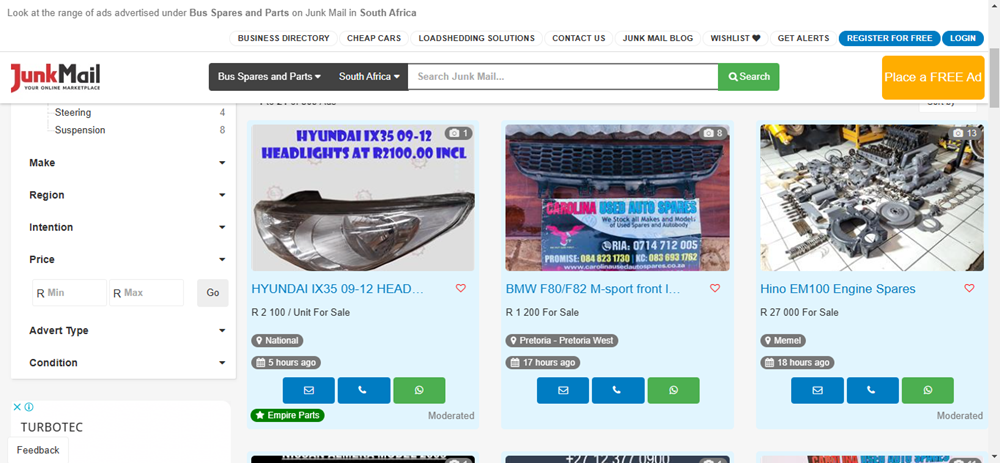Looking for ways to make your buses last longer, perform better, and avoid those dreaded breakdowns? Maintaining and servicing buses is crucial for any fleet owner in South Africa. Not only does it ensure a safe and reliable ride for passengers, but it also protects your investment and keeps business running smoothly. In this guide, we’ll share essential tips on maintaining and servicing these buses to keep your fleet on the road for years to come. Want to sell your bus? Place a free advert on Junk Mail, South Africa's trusted online marketplace for everything you need to buy and sell.

1. Why Regular Bus Maintenance Matters
Regular maintenance goes a long way in keeping your buses in prime condition, and it can prevent unexpected issues that could cost you more in the long run. When you commit to regular servicing, you’re not only ensuring passenger safety but also maintaining your brand’s reliability.
Take Action:
- Stay on top of your manufacturer’s maintenance schedule.
- Record every maintenance job and repair in detail – you’ll thank yourself later.
- Check critical components like brakes and tires regularly. They’re the backbone of bus safety!
2. Conducting Routine Inspections and Diagnostics
Inspections and diagnostics are like regular health check-ups for your buses. By checking under the hood regularly, you can catch small issues before they become major headaches.
What to Look For:
- Brake systems: Worn brakes are unsafe and costly to replace if they fail.
- Electrical systems: Malfunctions can cause everything from lighting issues to breakdowns.
- Tyres: Proper inflation and tread depth go a long way in ensuring road safety and fuel efficiency.
3. Engine and Transmission Care: The Heart of Your Bus
A well-cared-for engine keeps your bus going strong, and maintaining the transmission is just as essential. Ignoring these systems could mean expensive repairs and time lost.
Here’s How:
- Change the oil and filters regularly.
- Check and top up coolant and transmission fluids.
- Keep an ear out for strange noises – they’re often the first sign that something’s up.
4. Tyre Maintenance: Don’t Underestimate It!
Tyres are one of the most critical safety aspects of a bus. With good tire care, you’re looking at improved fuel efficiency, a smoother ride, and better handling.
Quick Tips:
- Rotate your tyres to get the most out of them.
- Ensure proper alignment and balance, which reduces wear and tear.
- Keep an eye on tyre pressure – underinflated tyres can hurt fuel efficiency and wear faster.
5. Keeping Your Brakes in Top Shape
Brake maintenance can’t be ignored if you want to ensure a safe, reliable service. Checking your brake system often not only prevents accidents but also keeps your repair bills down.
Pro Tip:
- Inspect brake pads for thinning and change them before they wear out completely.
- Check fluid levels regularly – it’s a quick task but crucial for safety.
- Test brakes often to make sure they’re responsive and reliable.

6. Battery and Electrical System Care
Ever had an unexpected breakdown due to battery issues? Prevent this by checking your batteries and electrical systems regularly, especially if your buses are equipped with lighting or digital displays.
Make It Easy:
- Clean battery terminals to avoid corrosion buildup.
- Test battery levels regularly to avoid sudden issues.
- Inspect wiring – it’s easy for small wear and tear to go unnoticed until it’s too late!
7. Keep It Clean: Interior and Exterior Maintenance
Passengers notice when a bus is clean and well-kept. Plus, regular cleaning keeps your bus free of grime, rust, and other structural issues that can crop up with time.
Cleanliness Checklist:
- Wash the exterior often to prevent rust.
- Keep the seats, floors, and windows spotless for passenger comfort.
- Apply rust-proofing on exposed metal parts to protect your investment.
8. Sourcing Quality Parts for Your Buses
Quality parts might come with a higher price tag, but they’re worth it for the added durability and reliability. Working with trusted suppliers, such as those found on our website, can ensure you’re getting top-grade parts that keep your buses running better for longer.
9. Train Drivers and Staff on Bus Maintenance Basics
A well-trained team can catch potential issues early, which is why it’s essential to teach both drivers and maintenance staff basic bus care practices. This can save time and prevent costly repairs down the road.
10. Setting Up a Maintenance Schedule
Finally, consistency is key. A good maintenance schedule is your best ally in ensuring your buses stay on the road for as long as possible. Planning out regular check-ups will help you avoid downtime and keep operations smooth.
Your Plan of Action:
- Tailor the schedule to your fleet’s needs and operating conditions.
- Schedule major repairs and services during off-peak hours.
- Keep a log of all work done – this not only helps with upkeep but also improves resale value if you ever decide to sell.
Maintaining and servicing buses is essential to keep your fleet in excellent condition and protect your investment. With a reliable maintenance plan, quality parts, and consistent care, you can extend the lifespan of your buses and keep passengers happy and safe. Interested in selling your bus? Create a free ad on Junk Mail, the most reliable online marketplace for buying and selling your items and services.




